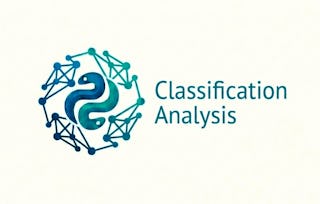Classification problems are one of the most common scenarios we face in data science. This course will help you understand and apply common algorithms to make predictions and drive decision-making in business. Whether you’re an aspiring data scientist, studying analytics, or have a focus on business intelligence, this course will give you a comprehensive overview of classification problems, solutions, and interpretations.

Classification - Fundamentals & Practical Applications
Seize the savings! Get 40% off 3 months of Coursera Plus and full access to thousands of courses.

Classification - Fundamentals & Practical Applications
This course is part of Practical Data Science for Data Analysts Specialization
Instructor: CFI (Corporate Finance Institute)
Included with
Gain insight into a topic and learn the fundamentals.
Advanced level
Designed for those already in the industry
3 hours to complete
Flexible schedule
Learn at your own pace
Skills you'll gain
- Machine Learning Methods
- Machine Learning Algorithms
- Logistic Regression
- Analytics
- Feature Engineering
- Data Analysis
- Business Metrics
- Performance Metric
- Machine Learning
- Data Modeling
- Applied Machine Learning
- Supervised Learning
- Exploratory Data Analysis
- Analysis
- Data Visualization
- Predictive Modeling
- Model Evaluation
- Advanced Analytics
Tools you'll learn
Details to know

Shareable certificate
Add to your LinkedIn profile
Assessments
1 assignment
Taught in English
See how employees at top companies are mastering in-demand skills

Build your subject-matter expertise
This course is part of the Practical Data Science for Data Analysts Specialization
When you enroll in this course, you'll also be enrolled in this Specialization.
- Learn new concepts from industry experts
- Gain a foundational understanding of a subject or tool
- Develop job-relevant skills with hands-on projects
- Earn a shareable career certificate

There are 7 modules in this course
Earn a career certificate
Add this credential to your LinkedIn profile, resume, or CV. Share it on social media and in your performance review.
Instructor
Offered by
Explore more from Finance
 Status: Free Trial
Status: Free TrialUniversity of Colorado Boulder
 Status: Free Trial
Status: Free Trial Status: Free Trial
Status: Free Trial Status: Free Trial
Status: Free Trial
Why people choose Coursera for their career

Felipe M.
Learner since 2018
"To be able to take courses at my own pace and rhythm has been an amazing experience. I can learn whenever it fits my schedule and mood."

Jennifer J.
Learner since 2020
"I directly applied the concepts and skills I learned from my courses to an exciting new project at work."

Larry W.
Learner since 2021
"When I need courses on topics that my university doesn't offer, Coursera is one of the best places to go."

Chaitanya A.
"Learning isn't just about being better at your job: it's so much more than that. Coursera allows me to learn without limits."

Open new doors with Coursera Plus
Unlimited access to 10,000+ world-class courses, hands-on projects, and job-ready certificate programs - all included in your subscription
Advance your career with an online degree
Earn a degree from world-class universities - 100% online
Join over 3,400 global companies that choose Coursera for Business
Upskill your employees to excel in the digital economy

